现代大学英语精读第二版2讲解
现代大学英语精读2课件lesson2

• n. detention
• be kept (held/placed) in detention
• detention centre (mainly Br. E)
• detention home
ห้องสมุดไป่ตู้
3. Clipping
• doc (doctor) • Back: dorm (dormitory), disco
• a. to prevent (sb.) from leaving for a certain time
• e.g. Police detained the man to make further inquiries.
• b. to delay
•
He was detained by business.
5. leap
• a leap forward/ahead • e.g. a new economic leap forward • by leaps and bounds: very quickly and
successfully • The population of China is growing by leaps and
4. Onomatopoeia (animal cries)
现代大学英语精读第二版book2unit1分析解析精选课件

Another School Year
Unit 1
Questions / Activities Check-on Preview Objectives
坚持
Warming up
Warming up Questions/Activities
• What do you go to college for? • How has your first semester in university
f_a_c_u_lt_y____ all the teachers of a university or college s_u_ff_ic_e_____ to be enough p_e_n_e_t_ra_t_in_g_ showing the ability to understand things clearly and
deeply s_a_v_a_g_e____ an uncivilized human being l_it_e_r_a_l ____ in a basic meaning of a word c_e_rt_if_y_____ to state something is correct e_n_r_o_ll_____ to officially arrange to join a university
坚持
Warming up Objectives
• Understand the occasion and stylistic features of the speech
• Think about the question of the purpose of university education
getting training for a job in a technical school but doing a B.Sc. at a university.
现代大学英语精读第二版book2unit1分析解析精选课件

a child of Italian immigrants Began his career teaching English at the University of
Kansas City Joined the US Air Force in 1942, served as a gunner in
AnAotnhoethr eSrcShcohooloYl eYeaarr–iardi John Ciardi
坚持
Another School Year
Unit 1
Warming up
B ackground T ext Analysis R einforcement
坚持
Warming up Objectives
• Understand the occasion and stylistic features of the speech
• Think about the question of the purpose of university education
literary endeavors.
坚持
Background
His Influence
Poet, translator, etymologist Major works:
现代大学英语(第二版)精读2 (2)
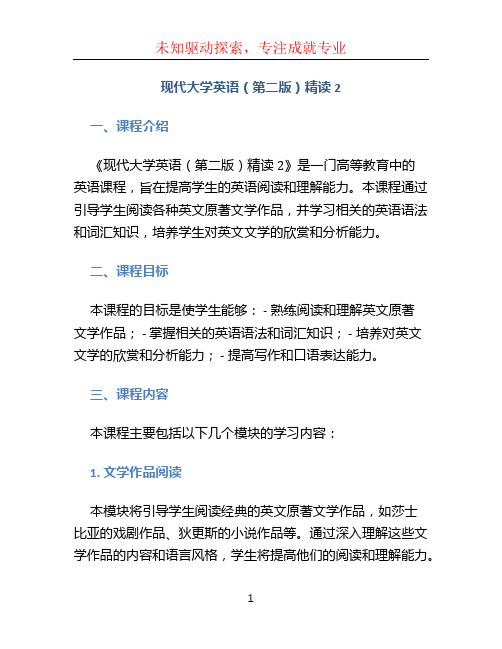
现代大学英语(第二版)精读2一、课程介绍《现代大学英语(第二版)精读2》是一门高等教育中的英语课程,旨在提高学生的英语阅读和理解能力。
本课程通过引导学生阅读各种英文原著文学作品,并学习相关的英语语法和词汇知识,培养学生对英文文学的欣赏和分析能力。
二、课程目标本课程的目标是使学生能够: - 熟练阅读和理解英文原著文学作品; - 掌握相关的英语语法和词汇知识; - 培养对英文文学的欣赏和分析能力; - 提高写作和口语表达能力。
三、课程内容本课程主要包括以下几个模块的学习内容:1. 文学作品阅读本模块将引导学生阅读经典的英文原著文学作品,如莎士比亚的戏剧作品、狄更斯的小说作品等。
通过深入理解这些文学作品的内容和语言风格,学生将提高他们的阅读和理解能力。
2. 语法和词汇学习本模块将重点学习与文学作品相关的语法和词汇知识。
通过学习这些知识,学生将能够更好地理解文学作品,并提高他们的写作和口语表达能力。
3. 文学分析和评论本模块将引导学生分析和评论阅读过的文学作品。
学生将学会通过分析作品的形式、结构、语言和主题等方面,深入理解文学作品的内涵和艺术价值。
四、教学方法和学习策略本课程将采用以下教学方法和学习策略:1. 讲授和讨论教师将通过讲授和讨论的方式,向学生介绍相关的文学作品和语法知识,并引导学生深入理解和思考。
2. 阅读和写作练习学生将通过大量的阅读和写作练习,巩固他们的阅读理解和写作能力。
3. 分组讨论和演讲学生将被分成小组,在小组中进行文学作品的分析和讨论,并进行相应的演讲,提高他们的口语表达能力和团队合作能力。
4. 独立研究和报告学生将被要求进行独立研究,并撰写相关的报告,提高他们的独立思考和写作能力。
五、课程评价与考核本课程的评价与考核主要包括以下几个方面:1.平时成绩:包括课堂参与、作业完成情况等。
2.阶段性考试:对学生的英语阅读和理解能力进行测试。
3.期末考试:综合考察学生对课程内容的掌握情况,包括阅读理解、文学分析和写作能力。
现代大学英语精读第二册语法点总结

现代大学英语精读第二册语法点总结Unit 1: the usages of future times;(将来时态)coordinating conjunctions(并列连词)Unit 2:“the way” in relative clauses (the way在关系从句中的用法)with + noun + preposition phrase/ participle /adjective construction (with结构做伴随状语)Unit 3: noun clauses (introduced by wh-words); (名词性从句)the gerund (动名词)Unit 4: appositive clause (同位语从句)indefinite pronoun: anybody/anyone; somebody / someone; everybody/ everyone; nobody/ no one; anything; something; everything; nothing (不定代词)Unit 5: the gerund; (动名词)the infinitive; (to do 不定式)attributive modifiers (定语)Unit 6:the present perfect continuous tense (现在完成进行时)the usage of the present participle phrase (现在分词)Unit 7:无(test)Unit 8:Comparative Degree (比较级:特别是the more….the more; bette r and better结构)Subject Complement (形容词做主语补足语:S+V+Adj.)Unit 9: with/without + noun phrase + an infinitive phrase (with、without在独立主格结构的应用)the infinitive as the subject (to do 不定式做主语)Unit 10:past participle phrase as adverbial (过去分词做定语的用法)Unit 11:part of speech (词性)Unit 12: ever/ never 的用法比较级的用法(特别是比较级前面有副词修饰;同级比较)Unit 13:V+O+C宾语补足语Could / might /should/ must +have done (虚拟语气)Unit 14:无(test)Unit 15:Parallelismsingle compound sentence (简单并列复合句) Unit 16:把疑问句改写为陈述句。
杨立民《现代大学英语精读(2)》(第2版)学习指南【词汇短语+课文精解+全文翻译+练习答案】
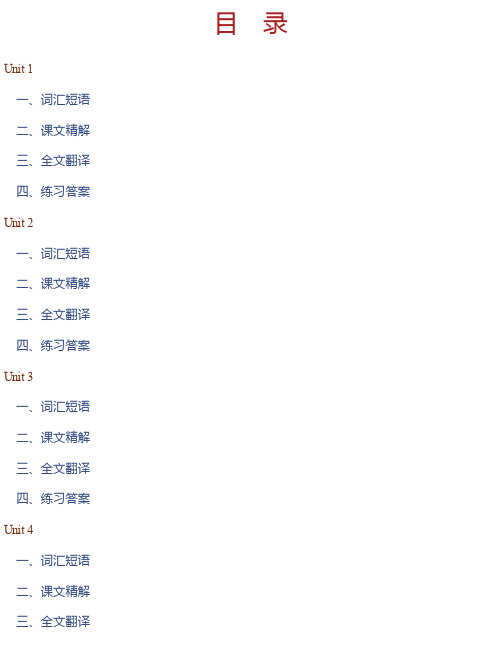
目 录Unit 1一、词汇短语二、课文精解三、全文翻译四、练习答案Unit 2一、词汇短语二、课文精解三、全文翻译四、练习答案Unit 3一、词汇短语二、课文精解三、全文翻译四、练习答案Unit 4一、词汇短语二、课文精解三、全文翻译四、练习答案Unit 5一、词汇短语二、课文精解三、全文翻译四、练习答案Unit 6一、词汇短语二、课文精解三、全文翻译四、练习答案Unit 7一、练习答案Unit 8一、词汇短语二、课文精解三、全文翻译四、练习答案Unit 9一、词汇短语二、课文精解三、全文翻译四、练习答案Unit 10一、词汇短语二、课文精解三、全文翻译四、练习答案Unit 11一、词汇短语二、课文精解三、全文翻译四、练习答案Unit 12一、词汇短语二、课文精解三、全文翻译四、练习答案Unit 13一、词汇短语二、课文精解三、全文翻译四、练习答案Unit 14一、练习答案Unit 15一、词汇短语二、课文精解三、全文翻译四、练习答案Unit 16一、词汇短语二、课文精解三、全文翻译四、练习答案Unit 1一、词汇短语Text Adisaster [di5zB:stE] n.灾难,灾祸;不幸【例句】These difficulties are caused by natural disasters. 这些困难都是由自然灾害造成的。
【助记】dis(不,没有)+aster(星星)→星星消失了,难道预示着灾难的来临?谐音“点扎死他”,灾难。
semester [si5mestE] n.学期;半年【例句】His writing has improved greatly in this semester. 这学期他的写作有了很大进步。
【助记】seme(看作semi半)+s+ ter(看作terra学期)→半学期beanpole [5bi:npEul] n.(插在地上供豆茎攀缘的)支竿,瘦长之人【例句】Li Ling’s elder sister is short and overweight while her younger sister is a beanpole.李玲的姐姐是个矮胖墩儿,可她妹妹却是个细高个儿。
版现代大学英语精读2-unit-2课文翻译say yes
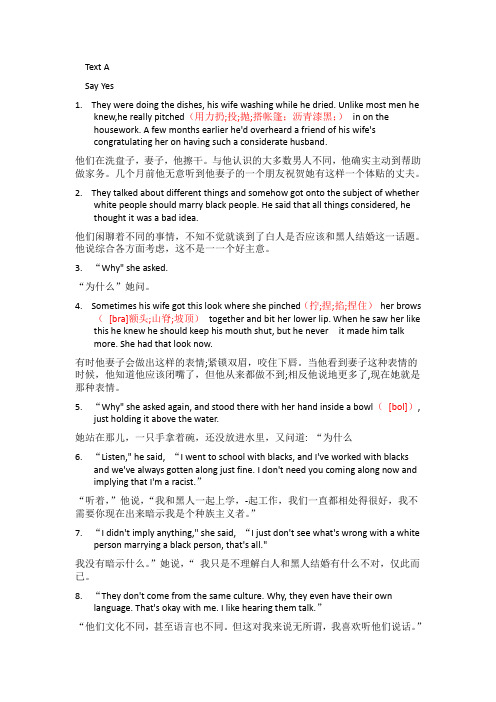
Text ASay Yes1.They were doing the dishes, his wife washing while he dried. Unlike most men heknew,he really pitched(用力扔;投;抛;搭帐篷;沥青漆黑;)in on thehousework. A few months earlier he'd overheard a friend of his wife'scongratulating her on having such a considerate husband.他们在洗盘子,妻子,他擦干。
与他认识的大多数男人不同,他确实主动到帮助做家务。
几个月前他无意听到他妻子的一个朋友祝贺她有这样一个体贴的丈夫。
2.They talked about different things and somehow got onto the subject of whetherwhite people should marry black people. He said that all things considered, he thought it was a bad idea.他们闲聊着不同的事情,不知不觉就谈到了白人是否应该和黑人结婚这一话题。
他说综合各方面考虑,这不是一一个好主意。
3.“Why" she asked.“为什么”她问。
4.Sometimes his wife got this look where she pinched(拧;捏;掐;捏住)her brows([bra]额头;山脊;坡顶)together and bit her lower lip. When he saw her like this he knew he should keep his mouth shut, but he never it made him talkmore. She had that look now.有时他妻子会做出这样的表情;紧锁双眉,咬住下唇。
现代大学英语精读2课件ppt
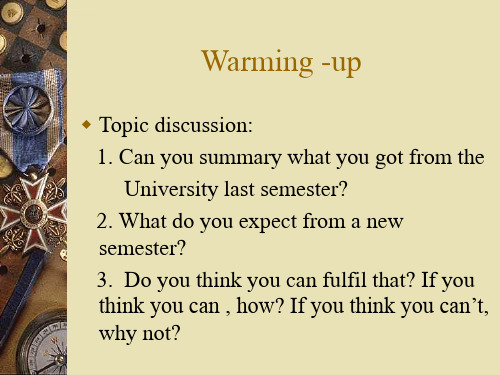
Warming -up
Topic discussion: 1. Can you summary what you got from the University last semester? 2. What do you expect from a new semester? 3. Do you think you can fulfil that? If you think you can , how? If you think you can’t, why not?
---- Mark Twain
从使用情况来看,闭胸式的使用比较 广泛。 敞开式 盾构之 中有挤 压式盾 构、全 部敞开 式盾构 ,但在 近些年 的城市 地下工 程施工 中已很 少使用 ,在此 不再说 明。
Text analysis
What did the writer do after he was fresh from graduate school?
Topic discussion
Suggested answers:
1. To give Ss sufficient training for a career. 2. To expose Ss to the essence of human
civilization 3. To cultivate the qualities of being a human 4. To gather useful information and knowledge 5. To encourage intellectual curiosity and cultural
版现代大学英语精读2-unit-2课文翻译sayyes
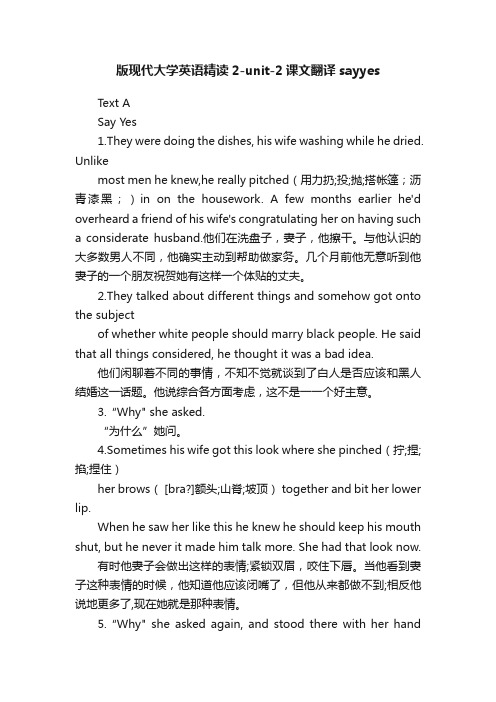
版现代大学英语精读2-unit-2课文翻译sayyesText ASay Yes1.They were doing the dishes, his wife washing while he dried. Unlikemost men he knew,he really pitched(用力扔;投;抛;搭帐篷;沥青漆黑;)in on the housework. A few months earlier he'd overheard a friend of his wife's congratulating her on having such a considerate husband.他们在洗盘子,妻子,他擦干。
与他认识的大多数男人不同,他确实主动到帮助做家务。
几个月前他无意听到他妻子的一个朋友祝贺她有这样一个体贴的丈夫。
2.They talked about different things and somehow got onto the subjectof whether white people should marry black people. He said that all things considered, he thought it was a bad idea.他们闲聊着不同的事情,不知不觉就谈到了白人是否应该和黑人结婚这一话题。
他说综合各方面考虑,这不是一一个好主意。
3.“Why" she asked.“为什么”她问。
4.Sometimes his wife got this look where she pinched(拧;捏;掐;捏住)her brows( [bra?]额头;山脊;坡顶) together and bit her lower lip.When he saw her like this he knew he should keep his mouth shut, but he never it made him talk more. She had that look now.有时他妻子会做出这样的表情;紧锁双眉,咬住下唇。
现代大学英语精读第二册语法点总结
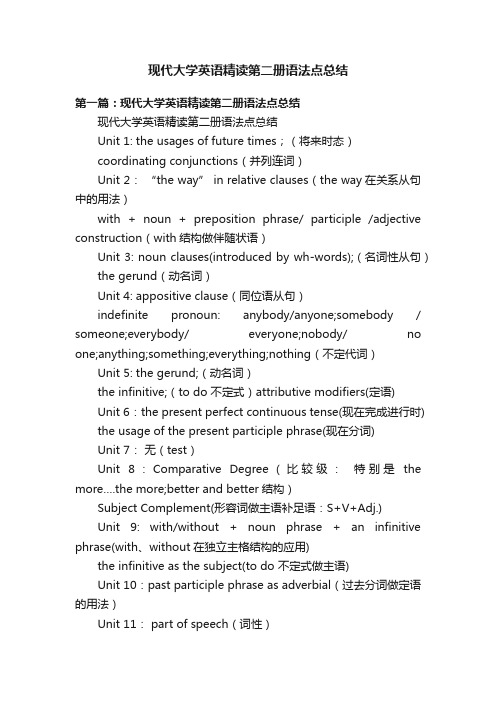
现代大学英语精读第二册语法点总结第一篇:现代大学英语精读第二册语法点总结现代大学英语精读第二册语法点总结Unit 1: the usages of future times;(将来时态)coordinating conjunctions(并列连词)Unit 2:“the way” in relative clauses(the way在关系从句中的用法)with + noun + preposition phrase/ participle /adjective construction(with结构做伴随状语)Unit 3: noun clauses(introduced by wh-words);(名词性从句)the gerund(动名词)Unit 4: appositive clause(同位语从句)indefinite pronoun: anybody/anyone;somebody / someone;everybody/ everyone;nobody/ no one;anything;something;everything;nothing(不定代词)Unit 5: the gerund;(动名词)the infinitive;(to do 不定式)attributive modifiers(定语)Unit 6:the present perfect continuous tense(现在完成进行时) the usage of the present participle phrase(现在分词)Unit 7:无(test)Unit 8:Comparative Degree(比较级:特别是the more….the more;better and better结构)Subject Complement(形容词做主语补足语:S+V+Adj.)Unit 9: with/without + noun phrase + an infinitive phrase(with、without在独立主格结构的应用)the infinitive as the subject(to do 不定式做主语)Unit 10:past participle phrase as adverbial(过去分词做定语的用法)Unit 11: part of speech(词性)Unit 12: ever/ never 的用法比较级的用法(特别是比较级前面有副词修饰;同级比较)Unit 13:V+O+C宾语补足语Could / might /should/ must +have done(虚拟语气)Unit 14:无(test)Unit 15:Parallelismsingle compound sentence(简单并列复合句)Unit 16:把疑问句改写为陈述句第二篇:大学英语精读第二册英语翻译整理1.她砰地关上门,一声不吭地走了,他们之间那场争执就此结束。
现代大学英语精读2
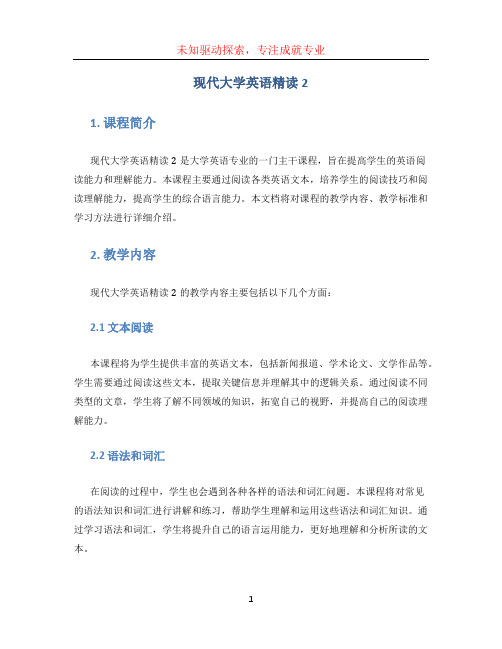
现代大学英语精读21. 课程简介现代大学英语精读2是大学英语专业的一门主干课程,旨在提高学生的英语阅读能力和理解能力。
本课程主要通过阅读各类英语文本,培养学生的阅读技巧和阅读理解能力,提高学生的综合语言能力。
本文档将对课程的教学内容、教学标准和学习方法进行详细介绍。
2. 教学内容现代大学英语精读2的教学内容主要包括以下几个方面:2.1 文本阅读本课程将为学生提供丰富的英语文本,包括新闻报道、学术论文、文学作品等。
学生需要通过阅读这些文本,提取关键信息并理解其中的逻辑关系。
通过阅读不同类型的文章,学生将了解不同领域的知识,拓宽自己的视野,并提高自己的阅读理解能力。
2.2 语法和词汇在阅读的过程中,学生也会遇到各种各样的语法和词汇问题。
本课程将对常见的语法知识和词汇进行讲解和练习,帮助学生理解和运用这些语法和词汇知识。
通过学习语法和词汇,学生将提升自己的语言运用能力,更好地理解和分析所读的文本。
除了提供文本和语言知识的学习,本课程还注重培养学生的阅读技巧。
学生将学习如何快速获取文本的主题和重点信息,如何分析文本的结构和逻辑关系,以及如何有效地记笔记和总结。
这些阅读技巧将有助于学生更高效地阅读各种英语文本,提高自己的阅读效率和准确性。
3. 教学标准现代大学英语精读2的教学标准旨在提高学生的英语阅读能力和理解能力。
教学标准包括以下几个方面:3.1 阅读能力学生需要通过本课程的学习,提高自己的整体阅读能力。
他们应能够快速阅读并理解各种类型的英语文本,并能够准确地提取文本中的关键信息。
同时,学生需要能够分析文本的结构和逻辑关系,把握文章的主题和推理过程。
3.2 词汇掌握学生需要掌握一定量的英语词汇,能够理解并正确使用常见的词汇。
他们还需要学会通过上下文推理词义,并能够积累和运用新的词汇。
3.3 语法运用学生需要掌握常见的英语语法知识,并能够正确运用这些知识。
他们需要理解句子的结构和语法规则,并能够根据需要调整句子的结构和表达方式。
现代大学英语精读第二版2第一课讲解.pdf

• the student body: all the students of the university
• body: a group of people who work or act together, often for an official purpose, or who are connected in some other way, e. g.
Sentence Paraphrase
• The word "beanpole“ means "a tall thin person",Here the writer deliberately evokes a "bean pole”, a pole farmers use as a support in growing beans.
III. Sentence Paraphrase
Text Analysis
Theme
The author tries to clarify the purpose of a university: to put the students in touch with the best civilization that human race has created.
… I had just completed my graduate studies and began teaching at the University of Kansas City.
Sentence Paraphrase
• Part of the student body was a beanpole with hair on top who came into my class, sat down, folded his arms, and looked at me as if to say "All right, teach me something.” (Para.1)
大学英语精读第二册讲解

Abraham Lincoln (18
09-1865): the 16th pres
ident of the U. S. and a
republican. Born in Kent
二动词不定式的逻辑主语动词不定式所表示的动作的执行者与整个句子的主语不指同一人或物时需要在动词不定式前加上一个逻辑主语常用forsb
大学英语 精读 第二册
Unit2 Lessons from Jefferson
Lessons from Jefferson
Thomas Jefferson, the third President of the United States, may be less famous t han George Washington and Abraham Lincoln, but most people remember at least one fact about him: he wrote the Declaration of Independence.
Of all Jefferson's many talents, one is central. He was above all a good and tireless writer. His comp lete works, now being published for the first time, w ill fill more than fifty volumes. His talent as an au thor was soon discovered, and when the time came to w rite the Declaration of Independence at Philadelphia in 1776, the task of writing it was his. Millions hav e thrilled to his words: "We hold these truths to be self-evident, that all men are created equal ..."
现代大学英语(第二版)精读2课文译文
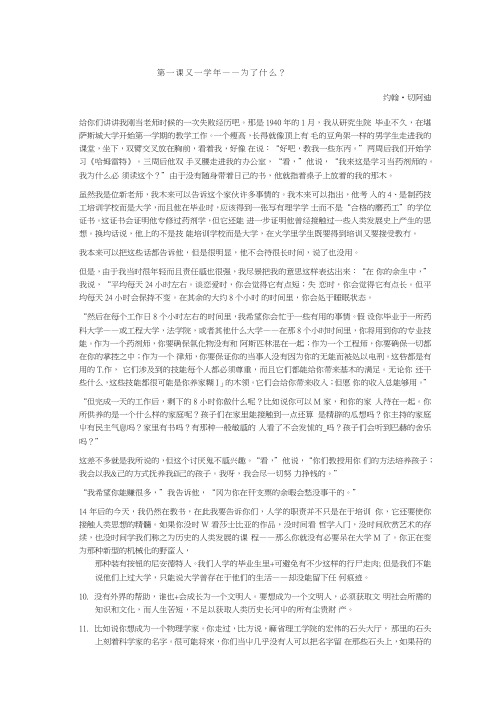
第一课又一学年——为了什么?约翰•切阿迪给你们讲讲我刚当老师时候的一次失败经历吧。
那是1940年的1月,我从研究生院毕业不久,在堪萨斯城大学开始第一学期的教学工作。
一个瘦高,长得就像顶上有毛的豆角架一样的男学生走进我的课堂,坐下,双臂交叉放在胸前,看着我,好像在说:“好吧,教我一些东丙。
”两周后我们开始学习《哈姆雷特》。
三周后他双手叉腰走进我的办公室,“看,”他说,“我来这是学习当药剂师的。
我为什么必须读这个?”由于没有随身带着日己的书,他就指着桌子上放着的我的那木。
虽然我是位新老师,我木来可以告诉这个家伙许多事情的。
我木来可以指出,他考入的4、是制药技工培训学校而是大学,而且他在毕业时,应该得到一张写有理学学士而不是“合格的磨药工”的学位证书。
这证书会证明他专修过药剂学,但它还能进一步证明他曾经接触过一些人类发展史上产生的思想。
换均话说,他上的不是技能培训学校而是大学,在火学里学生既要得到培训又要接受教冇。
我本来可以把这些话都告诉他,但是很明显,他不会待很长时间,说了也没用。
但是,由于我当时很年轻而且责任感也很强,我尽景把我的意思这样表达出来:“在你的余生中,”我说,“平均每天24小时左右。
谈恋爱时,你会觉得它有点短;失恋时,你会觉得它有点长。
但平均每天24小时会保持不变。
在其余的大约8个小时的时间里,你会处于睡眠状态。
“然后在每个工作日8个小时左右的时间里,我希望你会忙于一些有用的事情。
假设你毕业于一所药科大学——或工程大学,法学院,或者其他什么大学——在那8 个小时时间里,你将用到你的专业技能。
作为一个药剂师,你要确保氣化物没有和阿斯匹林混在一起;作为一个工程师,你要确保一切都在你的掌控之中;作为一个律师,你要保证你的当事人没有因为你的无能而被处以电刑。
这呰都是有用的T.作,它们涉及到的技能每个人都必须尊重,而且它们都能给你带来基木的满足。
无论你还干些什么,这些技能都很可能是你养家糊I」的木领。
现代大学英语精读2第二版Unit-2-Say-YesPPT课件

.
1
1862 Emancipation Proclamation
.
2
1963
.
3
If I were a black, would you …
.
4
What shall we do?
• Five Parts:
• Part I: Warm-Up Exercises (songs & poems) • Part II: Background Information (author and
.
7
I. On the Origin of Racism
Debates over the origins of racism often suffer from a lack of _c_la_r_it_y over the term. Many mix recent forms of racism with earlier forms of ethnic and national conflict. In most cases ethno-national conflict seems to _o_w_e_ to conflict over land and strategic resources. In some cases ethnicity and nationalism were _h_ar_n_e_s_s_e_d to wars between great religious empires (for example, the Muslim Turks and the Catholic Austro-Hungarians). As Benedict Anderson has suggested ethnic _id_e_n_t_it_y and ethno-nationalism became a source of conflict within such empires with the rise of print-capitalism.
现代大学英语精读六(第二版)教师用书Unit2分析解析

Unit 2A Rose for EmilyWilliam FaulknerAdditional Background Information on William FaulknerWilliam Faulkner was born and brought up in the American South and lived there for almost all his life. On November 14, 1888, the local newspaper in Jackson, Mississippi reported a news story: “A terrible tragedy was enacted at Ripley on Tuesday afternoon of last week—the widely and well-known Col. W. C. Falkner being the victim.” Col. Falkner had run for the Mississippi legislature and had been elected. But before he took office he was shot dead by his rival. Col. Falkner had been a local hero and a legendary figure. He was a pioneer in Mississippi, organized a regiment to fight for the South in the Civil War, practiced law after returning from the battlefields, bought a large plantation, built the first railroad in his hometown, and wrote a novel, which became a national best-seller. This “widely and well-known” Col. W. C. Falkner was William Faulkner’s great-grandfather.On September 25, 1897, Faulkner was born in this distinguished family. He spent his youth in Oxford, a small town in Mississippi. Although the old colonel had died before Faulkner came into this world, the boy grew up listening to all sorts of stories about his great-grandfather and other people in his hometown. The stories that his Negro nanny told him and the gossip he heard from the townspeople resting and chatting in the small downtown square provided Faulkner with an oral tradition of storytelling as an important part of his education.During World War I Faulkner served in the Royal Canadian Air Force. After the armistice in 1918 he returned to Oxford, and for some time he led his life in a rather listless way. He attended the University of Mississippi but left the university within a year; he tried his hand at poetry but without much success; he went north to the cultural metropolitan city of New York, but was driven back home soon by loneliness. He became a postmaster, but after three years at most, he resigned from this post. All this time, Faulkner had been reading, first, whatever interested him, and, later, the great poets and novelists. In New York, Faulkner met Sherwood Anderson, a famous writer, and then when he traveled to New Orleans in 1925, he gained entry into this artistic center through Anderson. Inspired by Anderson, Faulkner began to write novels.Faulkner wrote 19 novels and nearly a hundred short stories. The setting of 15 novels and the majority of the short fiction is the American South. In his third book Sartoris (1929), he created the fictional Yoknapatawpha County. In the same year, he published The Sound and the Fury (1929), one of his masterpieces. This novel owes much to James Joyce and the stream ofconsciousness technique. In another major work As I Lay Dying (1930), Faulkner relates a terrifying comic story to a ritualized burial journey. In this novel he experiments with multiple-point-of-view narration. Light in August (1932) is also one of Faulkner’s major novels. The high point of Faulkner’s development is th e brilliant Absalom, Absalom! (1936). His other major works include The Unvanquished, The Wild Palms, The Hamlet, The Town, The Mansion, Go Down Moses, A Fable, etc.As the setting of most of his works is the American South, Faulkner is regarded as a regional writer. But the word “regional” is misleading because Faulkner deals with some of the major universal themes in literature so profoundly that his work is read and recognized nationally and internationally. As far as writing techniques are concerned, Faulkner is among the great experimentalists of the 20th century novel. His effective use of stream of consciousness, multiple points of view, symbolism and imagery, places him among the rank of outstanding modern writers along with James Joyce and Virginia Woolf. In 1950, Faulkner won the Nobel Prize for Literature.The Themes and Writing Techniques of “A Rose for Emily”Although “A Rose for Emily” is one of his most frequently anthologized short stories and is widely used in the American classroom, Chinese students may find it difficult to understand and appreciate. Some of them may think it is a bizarre story about an old eccentric lady in an American Southern town. It’s true that the setting of the story is the American South. Yet, the theme of the story is universal, transcending the boundaries of time and space. Like many other works of great literature, this short story tells about love, death, honor, pride, change, and loss.In “A Rose for Emily” we can see how the author tells the good story skillfully; how he creates the requisite atmosphere for telling the story; how he maintains the suspense and unfolds the conflict bit by bit; and how he digs deep into the social world of his characters. This story is a rich and modern 20th-century literary text. Those who are not very familiar with modern American literature may therefore encounter obstacles in reading this story: vague references, ambiguities, symbolism, imagery, experimental point of view, jumbled time sequences, avoidance of clear transition s, withholding of vital information, etc. By exploiting those “tricks,” Faulkner hopes to invite readers to participate in the process of seeking the truths of the inner life of the characters in the story. Once we do, we will surely enjoy reading the stor y. It’s like working at a puzzle: the more parts we start to figure out, the more interesting the puzzle will become.The 1950 Nobel Prize presentation speech called Faulkner as the “unrivaled master of all living British and American novelists.” He is regarded as a “deep psychologist.” “A Rose for Emily” lives up to that high praise.Implicit Chronology (approximate)The narration of “A Rose for Emily” does not follow a normal chronological order. Instead, it shifts in time frequently and gives out bits of information about the main character, Miss Emily, in such a way that the reader has to piece them together by himself/herself. The following implicit chronology has been worked out on the basis of the information from the text.ca. 1855: Miss Emily was born to the richest family of slave-owners in the town.1861: The American Civil War broke out; Confederate troops from the town were commanded by Col. Sartoris.1865: The American Civil War ended.1870s: Mr. Grierson, Miss Emily’s father, had the family house built in the Gothic revival style. ca. 1886: Mr. Grierson died; Miss Emily’s inheritance was only the house; she was over thirty.ca. 1887: Homer Barron, Northern construction foreman, arrived; he and Miss Emily started courting.ca. 1888: Homer Barron could be seen no more; the smell in the house was noticed.1894: The Young Colonel Sartoris, as mayor of the town, exempted Miss Emily from taxes for life.ca. 1919: The Young Colonel died.ca. 1927-1928: The tax delegation visited Miss Emily.ca. 1929-1930: Miss Emily died at the age of 74.Notes: “ca.” is short for circa, meaning “about” used before an approximate date or figure. We must remember that Faulkner is not always accurate about the exact time of a certain event. The purpose of working out this chronology is to give students a rough idea of the time frame in which the story took place.Structure of the TextP art I (Paras. 1-14)This part begins with the death of Miss Emily, the daughter of an eminent Southern family andindicates who Emily was.When Miss Emily died, all the people in the town went to her funeral. (Para. 1)Miss Emily lived in a big old house on one of the best streets of the town. (Para. 2)When Miss Emily was alive, the older generation treated her as a tradition, a duty, a care anda sort of hereditary obligation. The mayor remitted her taxes. (Para. 3)When a new generation came along, its members wanted her to pay taxes like everyone else.A deputation visited her, but she firmly dismissed them. (Paras. 4-14)Part II (Paras. 15-28)In this part, there is a time shift to thirty years before the visit of the deputation.There was a bad smell from Miss Emily’s house. That was two years after her father’s death and a short time after her sweetheart disappeared. (Para. 15)The neighbors complained about the bad smell, but the town authorities didn’t want to embarrass Miss Emily by telling her straightforwardly. (Paras. 16-23)So, one night, four men secretively crossed Miss Emily’s lawn and sprinkled lime, and soon after that the smell was gone. (Para. 24)The townspeople felt sorry for Miss Emily because her father was so proud that he drove all her suitors away, and when he died, he left her almost nothing apart from the house. (Paras.25-26)The day after her father’s death, people came to offer their condolences, but Miss Emily refused to let them in the house, telling them that her father was not dead. (Paras. 27-28)P art III (Paras. 29-42)It describes how a construction foreman named Homer Barron, a Yankee, courted Miss Emily and how she behaved after her sweetheart disappeared.Because Miss Emily was courting a day laborer, a Northerner, people began to pity her.(Paras. 29-33)One day Miss Emily went to the drug store and bought poison. When asked what it was for, she refused to answer. (Paras. 34-42)P art IV (Paras. 43-53)This part describes in more detail how Emily and Homer Barron were seen together and what happened to Emily after his disappearance.When people saw Emily and Homer Barron together without any signs of their getting married, they thought she was providing a bad example to the young and asked Emily’s relatives to persuade her to get married. They were relieved to see that there were preparations for a marriage. (Paras. 43-45)Homer Barron went away and came back, and was admitted into the house one evening. That was when he was last seen. (Para. 46)Miss Emily did not appear on the streets for a long time. She grew older and her hair grew grayer. She died at the age of seventy-four. (Paras. 47-53)P art V (Paras. 54-60)This part describes what happened after Emily’s death—in an upstairs room, which no one hadentered except Miss Emily herself, the dead body of Homer Barron was found. It had been lying in that bed for forty years.Detailed Study of the Text1.What is the meaning of the title “A Rose for Emily?”The meaning of the title is ambiguous, and can be interpreted in various way. A rose is a cliché, symbolizing love and a pledge of faithfulness. From the story, we can see Miss Emily was denied by love. So, in this sense, the title has an ironic meaning. A rose can also mean a kind of memorial or an offering in memory of someone. Then, who offered a rose to Emily? Faulkner intentionally leaves the answer for the readers to find out. But different readers may arrive at different answers. Ambiguity is one of the characteristics of this story. Students should be encouraged to give their own interpretations and give answers to questions that may arise during their reading and class discussion.2.Who is telling the story?You learn a lot about many 20th-century literary text by asking, “who is telling the story?” That is not a very important question as regards 18th-century fiction or even 19th-century fiction because the narrator in stories written in those periods is usually a person who knows everything at any given moment. This is called “the omniscient (all-knowing) narrator”. Modern writers of the 20th-century, such as Faulkner, like to experiment with different narrative voices. In his long fiction, Faulkner often uses several narrative voices. In “A Rose for Emily”, he chooses to use “we”, the people of the town, as the collective narrator. The first sentence of the story is, “When Miss Emily Grierson died, our whole town went to her funeral...” In the following sections, “we” frequently appears as the narrator.3.Why did the author choose to use this collective narrator?“We” are the ordinary people of the town, representing the gossip of the town. They are, m ost of the time, not participants but observers of events. They are detached from Miss Emily, and therefore different from the “ladies” or “older people” mentioned in paragraph 31, who are more socially involved with Miss Emily, thus tending to be more judgmental. The townspeople are mainly interested in keeping track of events and sharing the information with people coming from outside the town. Yet, as people living in a small town in the South, they have their own values and attitudes. On the whole “we” should be regarded as a reliable narrator. However, “we” are unable to tell the story in a straightforward and systematic manner. As non-participants in the major events, this collective narrator does not know everything, hence this narrative point of view is limited. For example, none of “us” had been inside Miss Emily’s house until her death. So inevitably there are gaps in the narration that are bound to cause confusion among readers or listeners. That leaves a lot of room for readers to participate. As readers, we have to fill in the gaps and piece together the scattered bits of information by ourselves. This is the burden the author places on us, and at the same time, it is part of the enjoyment in reading such a story.4. When Miss Emily Grierson died, our whole town went to her funeral: the men through a sort of respectful affection for a fallen monument, the women mostly out of curiosity to seethe inside of her house, which no one save an old manservant—a combined gardener and cook—had seen in at least ten years. (Para. 1)save: prep.formal except for. e.g.: She answered all the questions save one.Translation:埃米莉·格里尔森小姐去世时,全镇的人都去送葬了。
现代大学英语第二版精读2-Uni...
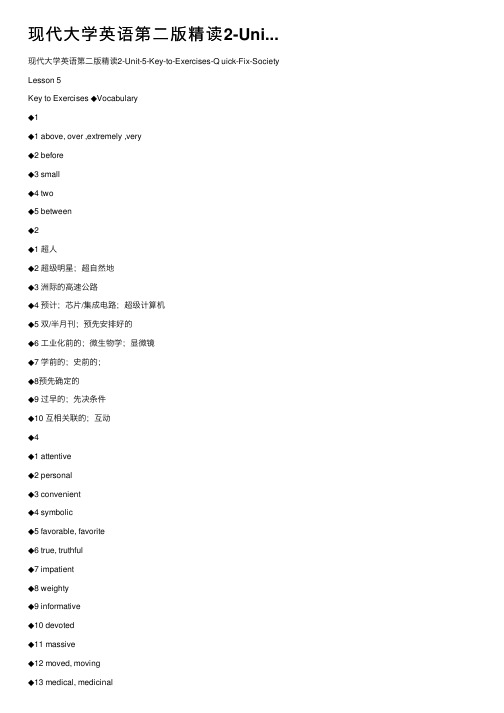
现代⼤学英语第⼆版精读2-Uni...现代⼤学英语第⼆版精读2-Unit-5-Key-to-Exercises-Q uick-Fix-Society Lesson 5Key to Exercises ◆Vocabulary◆1◆1 above, over ,extremely ,very◆2 before◆3 small◆4 two◆5 between◆2◆1 超⼈◆2 超级明星;超⾃然地◆3 洲际的⾼速公路◆4 预计;芯⽚/集成电路;超级计算机◆5 双/半⽉刊;预先安排好的◆6 ⼯业化前的;微⽣物学;显微镜◆7 学前的;史前的;◆8预先确定的◆9 过早的;先决条件◆10 互相关联的;互动◆4◆1 attentive◆2 personal◆3 convenient◆4 symbolic◆5 favorable, favorite◆6 true, truthful◆7 impatient◆8 weighty◆9 informative◆10 devoted◆11 massive◆12 moved, moving◆13 medical, medicinal◆14 pervasive◆15 musical◆2◆1 fast food◆2 best seller◆3 home-made bread◆4 musical excepts◆5 express mail◆6 life style◆7 personal relationship◆8 a mass movement◆9 subtle changes◆10 pastoral changes◆11 a rear-view mirror◆12 an exist sign◆13 a Civil War battlefield◆14 horse carriages◆15 antique cars◆16 factory outlets◆17 quality time◆18 deferred gratification◆19 a credit card◆20 ready-made clothes◆21 an Automatic Teller Machine◆22 a convenience store◆23 Polaroid store◆24 current affairs◆25 news briefings◆26 the Fifth Symphony◆27 classic novelQ Rewrite the sentences below using the expressions given in brackets.1. We have decided to slow down our economic growth so as to devote ourselves more to the improvement of people’s living standard.2. Lucy is good at swimming. More often than not she can win a prize in a contest.3. My sister said that she wanted to be on her own instead of working for that company any longer, but she had not saved up enough capital. She wondered if I could help her out.4. Thanks to government policy, the unemployment rate has dropped. It was reduced to less than four percent for the first half of the year.5. Joe was crazy about the raw fish and he stuffed himself with it. The fish didn’t agree with him, and that night he had a terrible stomachache. Finally hehad to go to the hospital for quick relief.6. I am getting sick and tired of this unpleasant job. We have been lingering over it for almost a week. Let’s finish it today somehow to get it over and done with.7. The new president ordered professors to double their publications in three years hoping that that would make the school more famous. Well, he sped out of control. Teaching suffered because the professors did not have enough time to devote to it. The quality of their publications also suffered and so did the professors’ health.◆4◆1 up, out◆2 down, at◆3 for; up◆4 aside/away; out of; with◆5 On; with◆6 with; off◆7 in; out◆8 in; of; on◆9 into; around; at◆10 out; in◆5◆1 The government will have to decide when and how to put brakes on the economy before it speeds out of control.◆2 Why waste money building an airport in the middle of nowhere? We must not ignore the fact that what people here need most is clean water and clean air.◆3 They thought they might take a different route on their return trip so as to explore the great canyon in Tibet.◆4 She traveled around the world and came back home quite a changed person, educated and greatly revitalized.◆5 There is no quick fix for our social problems. We should explore all possibilities and move one step at a time.◆6 All old traditions die a slow and lingering death/The disappearance/death of all old traditions is a slow and lingering process. Customs and habits that have taken so long to form can’t be expected to disappear overnight.◆7 Madam Chang was considered a pioneer who advocated combining classic Chinese music with Western music.◆8 When I heard the news, I was so stunned that for quite some time I didn’t know what to say.◆9 The soldiers are learning how to survive in the wilderness.◆10 I’ll go there with you if you insist. But really I won’t be much help to you.Q Point out the difference between the gerund and the infinitive when they are used as objects after the same verb.◆try doing sth: to do sth to see if it works or will be successful◆try to do sth: to make an effort or take action to do sth that you may not be able to do◆like doing sth: to enjoy doing sth, referring to a general preference◆like to do sth: to want or prefer to do sth, referring a particular case◆begin to do sth:very little difference◆begin doing sth:◆regret doing sth: to feel sorry about sth you did or did not do◆regret to do sth: {formal) used in writing to express sad feelings about sth that is disappointing or unpleasant ◆stop doing sth: not to continue what you had been doing◆stop to do sth: to stop (doing one thing) so as to do another◆mean doing sth: to have or represent a particular meaning◆mean to do sth: to intend to do sth◆◆2◆1 to live◆2 living, living◆3 arguing◆4 to watch◆5 pretending◆6 to perform◆7 trying◆8 settling down◆Translate, choosing between the gerund and the to-infinitive.◆1. Remember to bring your ID with you when you go to the airport.◆2. I remember feeling greatly disappointed after my first job interview.◆3. Finally they decided to apologize to the passengers for what had happened at the airport◆4. I’m sorry that I clean forgot to pass the message to Big Li.◆5. At midday we stop to have lunch in a fast food restaurant.◆6. I stopped listening about the disaster on the radio, but I was too shocked to move out of the chair.◆Fill in each blank with ONE suitable word.◆⑴affect◆(2) signs◆(3) passing◆(4) depend◆(5) providing◆(6) lack◆(7) Whether◆(8) superficial◆(9) on◆(10) isolated◆4◆1◆1 prepositional phrase◆2 adjective phrase◆3 three to-infinitive phrase◆4 past participle phrase◆5 present participle phrase◆6 adjective◆2◆1 sth important to say◆2 known as a nation on wheels◆3 as well-informed about Beijing opera as Anna◆4 called the sixth generation of Chinese directors◆5 living and working overseas/ abroad/in foreign countries◆6 with a big nose and big hands◆7 sitting in the corner◆8 to play center forward/central forward on the university team◆9 anything particular to do◆10 all the things mentioned above◆Identify and correct the mistake(s) in each of the sentences.◆Those who refused to work for the invaders were sent to concentration camps.◆I don’t remember seeing the man anywhere before.◆Some day they will bitterly regret having done what they did.◆4. The teacher didn’t leave the shaking building until all his students had.◆5. It wasn’t long before an ambulance arrived and rushed the injured man to a nearby hospital.◆6. In the library, a friend of mine found the book I wanted.◆7. I wouldn’t beli eve it unless/even if I saw it with my own eyes.◆8. Whatever your feelings may be, don't let them interfere with your work.◆9. Shrieking and stumbling, the residents rushed out of the burning house.◆10. The American journalist who taught News Reporting at our university three years ago is coming again next semester.。
- 1、下载文档前请自行甄别文档内容的完整性,平台不提供额外的编辑、内容补充、找答案等附加服务。
- 2、"仅部分预览"的文档,不可在线预览部分如存在完整性等问题,可反馈申请退款(可完整预览的文档不适用该条件!)。
- 3、如文档侵犯您的权益,请联系客服反馈,我们会尽快为您处理(人工客服工作时间:9:00-18:30)。
Sentence Paraphrase
• Two weeks later we started Hamlet.(Para.1)
• Obviously, the writer was teaching a course on Shakespeare. In such a course, generally five of Shakespeare's plays are studied. Hamlet generally included.
• • part of the student body: one of the students
• the student body: all the students of the university
• body: a group of people who work or act together, often for an official purpose, or who are connected in some other way, e. g.
believes to be the purpose of a university: putting its students in touch with the best civilizations the human race has created.
Sentence Paraphrase
• Let me tell you one of the earliest disasters in my career as a teacher.(Para. 1)
• with his hands on his hips: This shows that the student wasn‘t carrying anything, and what’s more, this business-minded young man came to challenge his instructor, like a customer questioning the goods or service they have bought.
Sentence Paraphrase
That is to say, he had not entered a technical training school but a university and in universities students enroll for both training and education. (Para. 2)
• The word “disaster” often means “an unexpected event, such as a very bad accident, a flood or a fire that kills a lot of people or causes a lot of damage”. Here, used informally, it means "a complete failure". The writer exaggerates the situation and uses the word humorously.
• The B. S. certificate would be official proof that the holder had special knowledge of pharmacy, but it would also be proof that he/she had been exposed to some profound ideas of the past.
Sentence Paraphrase
… I was fresh out of graduate school starting my first semester at the University of Kansas City. (Para. 1)
to have just come from a particular place, to have just had a particular experience, e.g. students fresh from college
• The sentence tells us what an unfavorable impression the student left on the writer the first day he came to class. First, he was referred to as “a beanpole with hair on top” (顶上长 了毛、种豆角时用的长竿).Also, his manners irritated the writer: instead of listening attentively and taking notes, he behaved as if he had paid to watch a show of some sort and was waiting to be entertained.
• new to sth.: not yet familiar with sth. because you have only just started, arrived, etc.
Sentence Paraphrase
I could have pointed out that he had enrolled, not in a drugstore-mechanics school, but in a college and that at the end of his course meant to reach for a scroll that read Bachelor of Science. (Para. 2)
• Let me tell you something that happened when I first became a teacher. It was one of the exasperating experiences in the first days of my teaching career.
Text Analysis
Structure
Part 1 (Paras. 1—8 ):The writer describes his
encounter with one of his students.
Part 2 (Paras.9—14 ):The author restates what he still
– certify that...: to state officially, especially in writing – specialize in: to limit all or most of one's study, business, etc. to
a particular activity or subject, – generate: to produce or create sth., e. g
Sentence Paraphrase
• It would certify that he had specialized in pharmacy, but it would further certify that he had been exposed to some of the ideas mankind has generated within its history.(2)
• In the remaining part of the paragraph, the writer tells us what he could but did not say to the student.
• Note that the writer now referred to the student as a specimen in a humorous way, meaning he was typical of those students who came to a university just to get training for a career, as if he were typical of a certain species of animal.
Sentence Paraphrase
• New as I was to the faculty, I could have told this specimen a number of things·(2)
• Though I was a new teacher, I knew I could tell him what "university was for. But I didn't. (我虽然经验不多) 也讲得出这些道埋(但我没有讲)。
Sentence Paraphrase
• The word "beanpole“ means "a tall thin person",Here the writer deliberately evokes a "bean pole”, a pole farmers use as a support in growing beans.
Sentence Paraphrase
• Three weeks later he came into my office with his hands on his hips. “Look,” he said, "I came here to be a pharmacist. Why do I have to read this stuff?“ (1)
